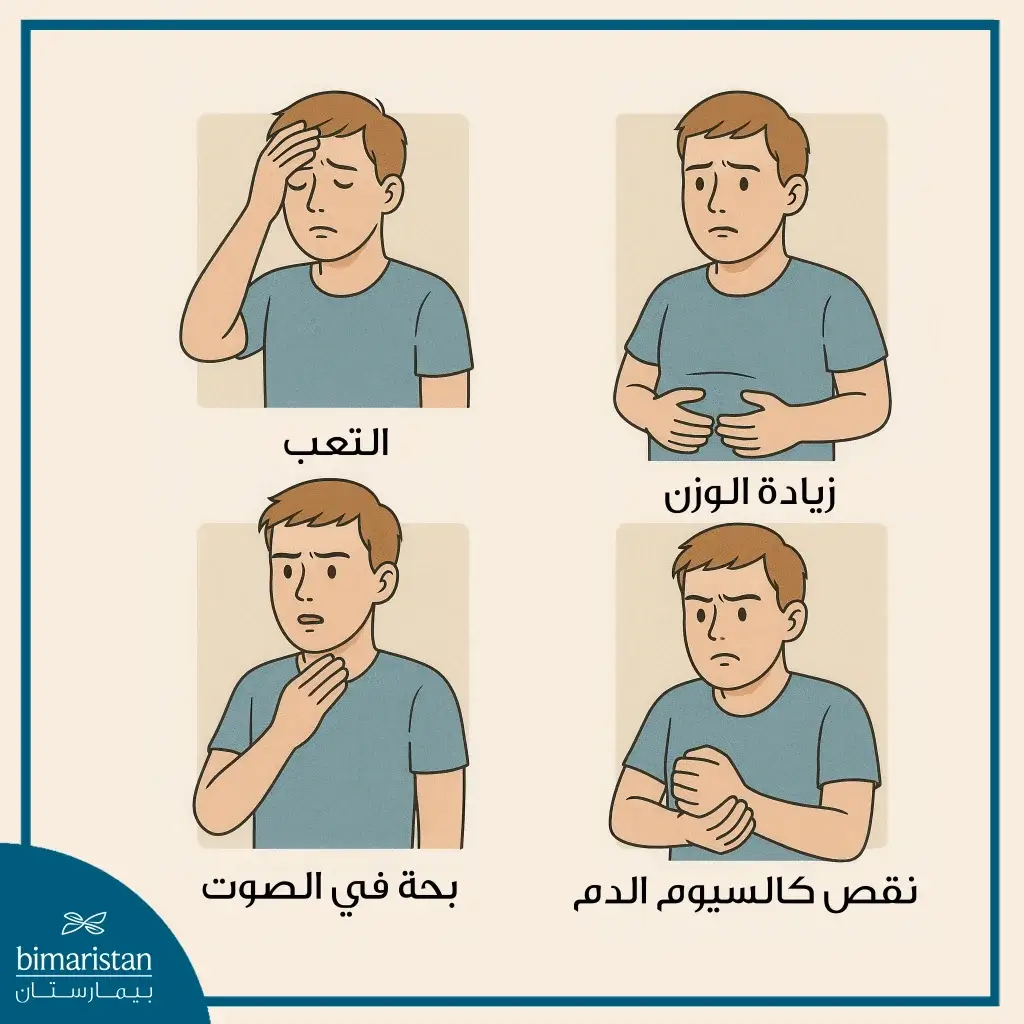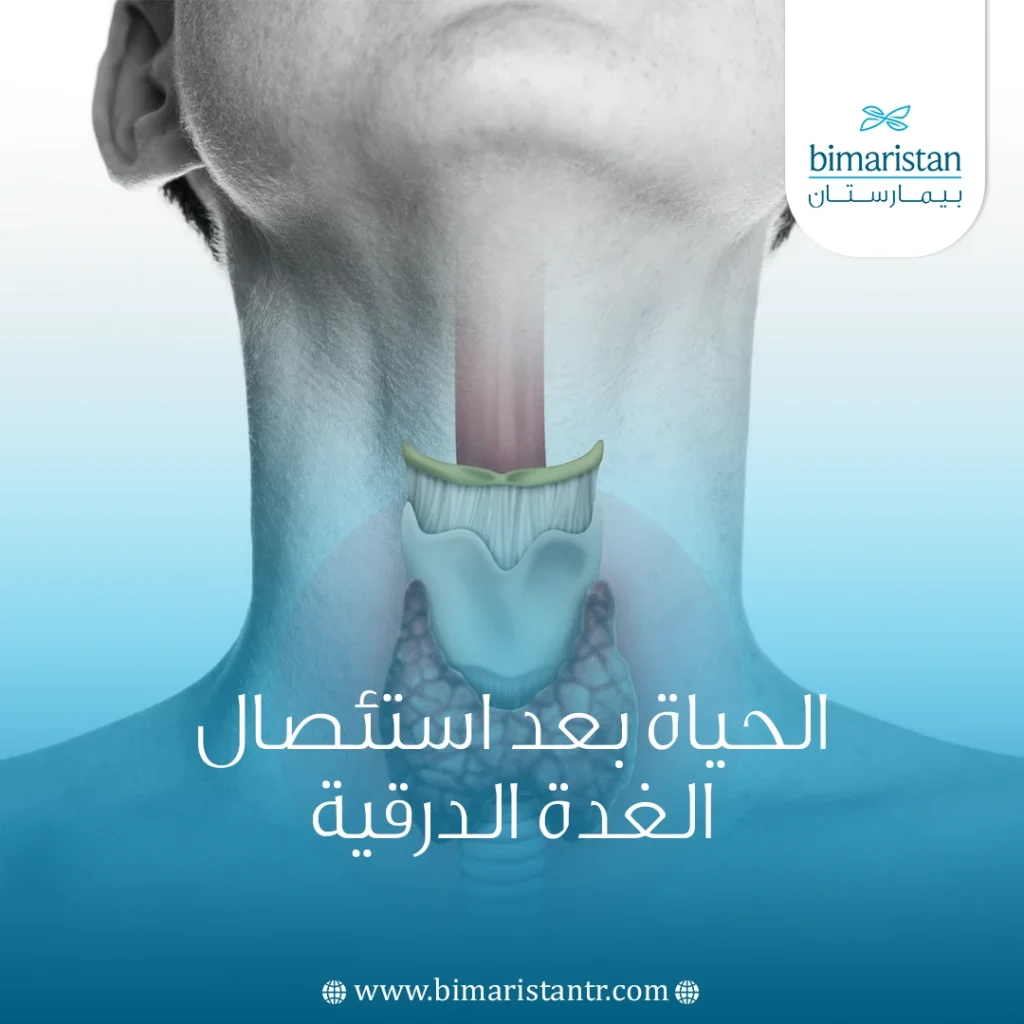استئصال الغدة الدرقية هو إجراء جراحي ضروري لعلاج حالات مثل السرطان أو فرط النشاط الدرقي ،وتكون الحياة بعد استئصال الغدة الدرقية تتطلب متابعة طبية مستمرة لضبط الجرعة المناسبة من الهرمونات البديلة مثل الليفوثيروكسين، مما يساعد في الحفاظ على التوازن الهرموني والتمتع بحياة صحية ومستقرة. هذه المتابعة تساهم في تجنب المشاكل الصحية المحتملة وتحقيق أفضل النتائج على المدى الطويل.
تعريف بـ عملية استئصال الغدة الدرقية
الغدّة الدّرقية thyroid gland هي غدة صماء غير قابلة للتجدد على شكل فراشة تقع في مقدمة الرقبة أسفل تفاحة ادم مباشرةً ولها دور كبير حيث تقوم بإنتاج وإفراز الهرمونات التي تتحكم بالعديد من الوظائف الأساسية في كامل جسم الإنسان كضبط معدل ضربات القلب وسرعة حرق الدهون.
يعتمد مقدار الاستئصال خلال العملية على سبب إجرائها، فقد تحافظ الغدة على وظيفتها الطبيعية في الاستئصال الجزئي بينما ستحتاج إلى معالجة معاوضة يومية بالهرمونات الدرقية لاستعادة وظيفة الغدة في الاستئصال الكلي.
تعتبر عمليّة استئصال الغدّة الدّرقية thyroidectomy جراحة بسيطة تجرى تحت تحت تخدير عام عبر جرح صغير أفقي في مقدمة الرّقبة، وقد أمكن إجراؤها في تركيا عبر جرح لا يتجاوز 3-4 سم عبر تقنيات طفيفة التوغل تتضمن استئصال الغدد الدرقية بالمنظار واستئصال الغدد الدرقية بواسطة الروبوت.
متى يُلجأ إلى استئصال الغدة الدرقية؟
يلجأ إلى استئصال الغدة الدرقية في كثير من الحالات ومنها:
- سرطان الغدة الدرقية: السبب الأكثر شيوعًا لإجراء عمليات للغدة الدرقية، حيث يعتبر استئصال الغدة مع خلايا الورم العلاج الأساسي لسرطان الغدة الدرقية.
- فرط نشاط الغدة الدرقية: حالة من زيادة الهرمونات الدرقية في الدم بسبب داء جريفز أو بسبب عقيدات أو ورم سليم في الغدة أو غيرها من الأسباب التي تترافق بزيادة دائمة في كمية هرمون الدرق، إن إزالة جزء من الغدة تقلل من النشاط الزائد للغدة.
- السلعة الدرقية الكبيرة (تضخم الغدة الدرقية): يلجأ إلى استئصال الغدة الدرقية بسبب ضخامتها التي قد تؤثر على مجرى التنفس أو على عملية بلع الطغام.
- السلعة متعددة العقد: والتي تؤدي إلى فرط في إفراز الهرمونات الدرقية إضافة إلى المشاكل المتعلقة بحجمها الكبير وإمكانية تحولها إلى السرطان.
الآثار الجانبية المحتملة للعملية
من مخاطر عملية استئصال الغدة الدرقية نادرة الحدوث:
- النزف وتشكل الخثرات الدموية
- الإنتان أو التهاب الحلق
- انسداد الطرق الهوائية بسبب النزف
- إصابة الطريق الهوائي بأذية أثناء الجراحة
- تغيرات في الصوت أو خشونة قد تكون بسبب أذية العصب الحنجري
- فرط نشاط الغدة الدرقية نتيجة حصول ارتفاع حاد في مستويات الثيروكسين خلال العمليّة أو بعدها بقليل
- أذية الغدد جارات الدرق وانخفاض مستويات هرمون الباراثورمون (الذي يتحكم بمستويات كالسيوم الدم)
ما الذي يحدث بعد استئصال الغدة الدرقية؟
بعد الجراحة ، يتم نقل المريض إلى غرفة الاستشفاء حيث يتم مراقبة تعافيه من الجراحة والتخدير، قد يحتاج بعض المرضى إلى تركيب تصريف تحت الشق في الرقبة، وعادةً ما يُزال هذا التصريف في اليوم التالي.
وأن المريض يصاب بأعراض قصور الغدة الدرقية مثل جفاف الجلد، التعب، وزيادة الوزن لذا يجب عليه أن ينتقل من حالة النشاط الهرموني الطبيعي (يوثيرويد) الذي توقف إلى الاعتماد الكامل على الهرمونات الاصطناعية، والتي تُعرف باسم ليفوثيروكسين (Levothyroxine).
يُستخدم هذا الدواء كعلاج تعويضي دائم لتعويض نقص هرمون T4، ويُؤخذ مدى الحياة، بهدف الوصول إلى القيم المستهدفة لهرمون TSH، والمحافظة على توازن وظائف الجسم الأيضية.

التغيرات الجسدية بعد استئصال الغدة الدرقية
عند العودة إلى المنزل، يمكن العودة إلى الأنشطة اليومية. ومع ذلك، يجب الانتظار من 10 أيام إلى أسبوعين قبل القيام بأي أنشطة شاقة مثل رفع الأثقال أو ممارسة الرياضات العنيفة.
حيث أنه عادة ما يحدث للإنسان العديد من التغيرات الجسدية منها:
- تغيرات في الوزن والطاقة: تختلف الزيادة في الوزن باختلاف سبب الجراحة.
- احتمالية تساقط الشعر أو جفاف الجلد: ناتجة عن الاضطرابات الهرمونية في الجسم.
- تأثير على المزاج أو التركيز: حدوث تقلبات بالمزاج مثل القلق والاكتئاب.
- أعراض نقص أو زيادة جرعة الهرمون البديل.
- أوجاع العضلات وآلامها وتيبُّسها أو ضعف العضلات.
- بُطء سرعة ضربات القلب.
المتابعة الطبية والحياة بعد استئصال الغدة الدرقية
هناك العديد من القواعد التي يجب على المريض القيام بها بعد عملية الاستئصال الجراحي وتشمل:
- زيارات منتظمة لتقييم الجرعة المناسبة من الهرمون: يجب مراجعة الطبيب الدورية لتحديد الجرعة المناسبة للعلاج بالهرمونات البديلة حيث تتغير الجرعة من 25 إلى 100 بناء على حالة المريض الصحية ومستوى هرمونات في الدم.
- تحاليل دورية لهرمون TSH وT4: إجراء تحاليل دورية لقياس هذه الهرمونات، وذلك لضمان أن الدواء يحدث التأثير المطلوب كالية معاوضة في تنظيم وظيفة الغدة الدرقية.
- أهمية الانتظام في تناول الدواء على الريق: لضمان امتصاصه بشكل صحيح دون تأثيرات من الطعام.
التغذيةونمط الحياة بعد استئصال الغدة الدرقية
يمكن تناول الطعام والشراب بشكل طبيعي بعد العمل الجراحي ولكن في بعض الأحيان قد يشعر المريض بصعوبة في البلع في الأيام الأولى بعد العمل الجراحي لذا ينصح في البداية بشرب السوائل وتناول الأطعمة اللينة مثل الطعام المهروس، ويُفضل اتباع نظام غذائي متوازن وصحي، منخفض السكريات، ويحتوي على الخضروات، وتناول البروتينات قليلة الدهون، والفواكه منخفضة السكريات ،كما يفضل تجنب تناول مكملات الكالسيوم أو الحديد في نفس توقيت حبوب العلاج الهرموني، لذلك يجب الفصل بينهما مدة 4 ساعات لتفادي تداخل الامتصاص.
هل يمكن عيش الحياة بعد استئصال الغدة الدرقية بشكل طبيعي؟
قد يظن المريض، بمجرد خروجه من العمل الجراحي، أن معاناته مع المرض قد انتهت. إلا أن تجارب المرضى السابقة تُظهر بوضوح أن هناك تدهورًا يحدث في جودة الحياة بعد استئصال الغدة الدرقية، ويستمر لعدة أشهر قبل أن يبدأ بالتحسن تدريجيًا خلال السنوات الخمس التالية للجراحة.
وقد لوحظ من التجارب السابقة أن هذا التراجع يكون أشد وضوحًا لدى المرضى الذين خضعوا لجراحة تقليدية مقارنةً بمن أُجريت لهم الجراحة عن طريق الوصول البعيد (مثل الإبط أو خلف الأذن)، حيث سجّل هؤلاء درجات رفاهية جسدية أقل، لا سيما الذين خضعوا لاستئصال كامل للغدة الدرقية. وفي المقابل، أبدى مرضى الجراحة بالوصول البعيد رضًا أكبر عن مظهرهم الخارجي مقارنة بمرضى الجراحة التقليدية.
أما المرضى الذين تلقوا علاجًا باليود المشع، فقد سجلوا انخفاضًا في حاسة التذوق، وخاصة أولئك الذين توقفوا بشكل مؤقت عن تناول العلاج الهرموني (الليفوثيروكسين) كجزء من الانسحاب الهرموني، حيث ظهرت لديهم أيضًا مشاكل في النوم، واضطرابات في الهوية الذاتية، وشعور بالضيق بعد ثلاثة أشهر من الجراحة، مقارنة بالمرضى الذين تم تحفيزهم باستخدام الـTSH الصناعي.
من المضاعفات التي تظهر بعد الجراحة أيضًا: نقص الكالسيوم في الجسم سواء المؤقت أو الدائم، والذي ينعكس سلبًا على قدرة المريض الجسدية، خاصة خلال السنوات الثلاث الأولى بعد الجراحة.
كذلك،يوجد مجموعة من الأعراض التي استمرت دون تحسن ملحوظ، من أبرزها:
- زيادة الوزن
- التحسس من البرد أو الحرارة
- تغيرات في الصوت
- احتباس السوائل في الجسم
ومن الجانب النفسي، عانى العديد من المرضى من القلق واضطرابات المزاج قبل الجراحة، واستمرت هذه الأعراض بعد العملية، لكنها بدأت بالتحسن التدريجي مع الوقت والمتابعة النفسية والطبية الدقيقة.
إلا أن الملاحظة الملفتة هي أن المشكلات المرتبطة بالمظهر الخارجي للعنق الناتج عن أثر الجراحة لم تشهد تحسنًا واضحًا بمرور الوقت.
الحياة بعد استئصال الغدة الدرقية تتطلب التزامًا بالمتابعة الطبية المنتظمة لضبط مستويات الهرمونات عبر تحاليل دورية، الانتظام في تناول العلاج بشكل صحيح يسهم في تحسين جودة الحياة للمرضى، ويقلل من الأعراض الجانبية، مما يساعدهم على التكيف بشكل أفضل بعد الجراحة.
المصادر:
- Authors. (2023). Title of the article. Journal Name, Volume(Issue), page numbers.
- MedlinePlus. (n.d.). Thyroidectomy: After your surgery. U.S. National Library of Medicine. Retrieved July 9, 2025, from
